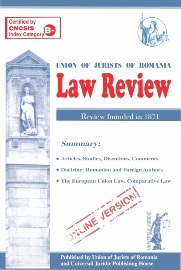FORMS OF UNMARRIED COUPLES IN THE EU STATES
FORMS OF UNMARRIED COUPLES IN THE EU STATES
Author(s): Amelia Diaconescu, Iulia FetitaSubject(s): Law, Constitution, Jurisprudence, Civil Law, EU-Legislation
Published by: Universul Juridic
Keywords: concubinage; free union; non-marital relationships; patrimonial relationships;
Summary/Abstract: In principle, there is no concept that clearly defines a couple that is not married. The terms used to describe these situations, at a legal level in the EU states are numerous and leave place for interpretation regarding their meaning: co-habitation, concubinage, free union, unmarried couple, de facto couple, and registered partnership. The majority of the EU member states have not yet inserted a general definition of the “unmarried couple” in their national legislation, this concept being rather defined by the jurisprudence which either stipulated that there is a concubinage when two persons live together in a stable and continuous way (it’s the case of France), to when this union is characterized by a “residential, economic and sexual residence”, where the main difference between union and marriage is exclusively the couple’s will regarding this relationship (it’s the case of Austria, Belgium and Greece). From a comparative study of the member states’ internal law, we may notice that there are two categories of unions: the unmarried couple, with no formality involved, “the de facto couple”, “concubinage”, “co-habitation”, “free union” and the unmarried couple, tied by a contract or a registered partnership issued by a public authority (contract-partnership and institution-partnership)
Journal: Law Review
- Issue Year: 2017
- Issue No: Supliment1
- Page Range: 93-100
- Page Count: 8
- Language: English
- Content File-PDF

